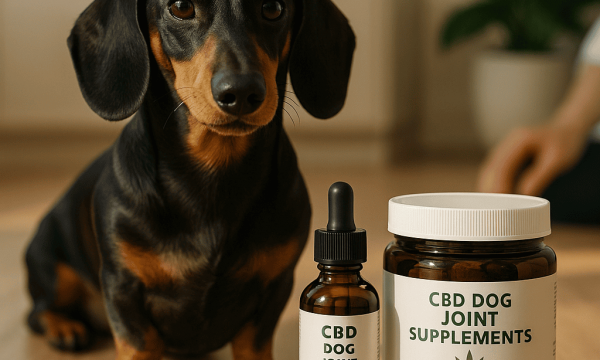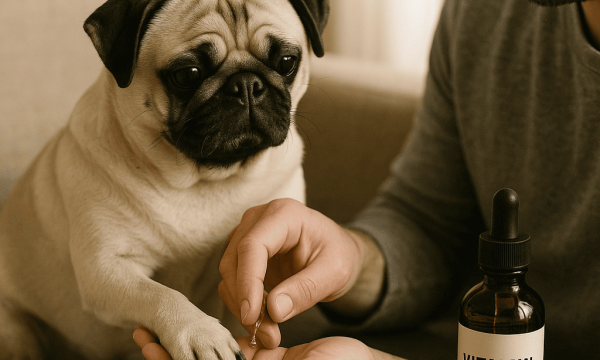Caring for your dog means paying close attention to even the smallest changes in their health or behavior. Probiotics may support your dog’s digestive and immune systems, particularly when subtle signs of discomfort appear. In this guide, you’ll learn about the most common reasons dogs may benefit from probiotics, why these supplements matter, and how to choose the right formula together with your veterinarian.
Why Probiotics Matter for Dogs
Probiotics are live microorganisms, primarily beneficial bacteria, that may support a healthy balance of microflora in your dog’s gut. A balanced gut microbiome is essential for more than just digestion—it can impact immune function, skin and coat health, energy levels, and even behavior. When this balance is disrupted by stress, illness, antibiotics, or dietary changes, your dog might begin to show subtle (or sometimes not-so-subtle) signs that something isn’t quite right.
Research suggests that canine-specific probiotics can support gut health, especially when introduced thoughtfully and as part of a broader wellness plan. It’s important to note that not every dog will require probiotics, but in certain cases, these supplements may help your pet feel and function their best.
The Role of the Gut Microbiome
Your dog’s intestines host trillions of microorganisms—bacteria, fungi, and even viruses—that together form what scientists call the “gut microbiome.” This tiny ecosystem does much more than just help break down food. It influences nutrient absorption, vitamin synthesis, immune defense, and even mood regulation via the “gut-brain axis.” When the gut microbiome is in harmony, your dog is likely to feel better, digest food efficiently, and fend off many common ailments.
The Top 10 Signs Your Dog May Need Probiotics
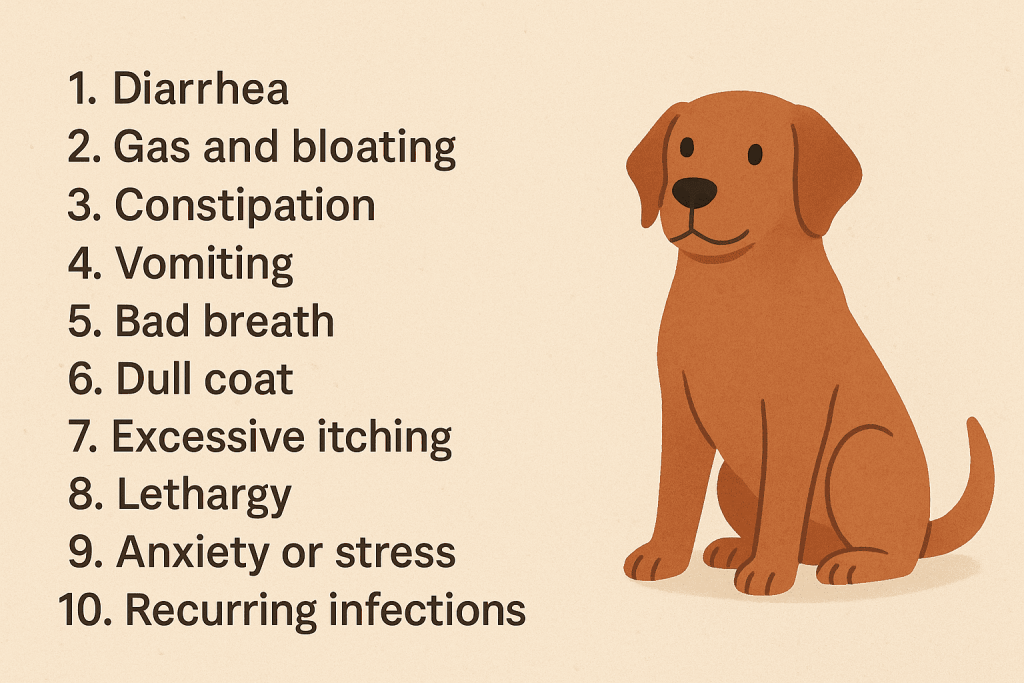
Even attentive owners can overlook the early signs of digestive or immune upset. Here are ten signs to watch for, with detailed explanations of how probiotics may help in each case:
1. Chronic Diarrhea & Loose Stool
Occasional soft stools are not uncommon, but persistent diarrhea—lasting more than a few days—often indicates a disruption in the gut flora. Dogs experiencing this may benefit from probiotics that help restore a healthy balance of bacteria in the intestines. Probiotics may support firmer stools, better water absorption, and overall digestive comfort. Still, it’s crucial to consult your veterinarian, as chronic diarrhea can signal serious underlying problems.
What to watch for:
- Stools that are loose, watery, or occur with increased frequency
- Accidents in the house in previously house-trained dogs
- Dehydration or weight loss (track in lbs/kg)
2. Recurring Gas or Bloating
Most dogs pass gas occasionally, but ongoing or excessive flatulence, a distended abdomen, or repeated “belly noises” can point to an imbalance in gut bacteria. Some bacteria produce excess gas when digesting certain foods, leading to discomfort for your pet.
How probiotics may help:
By promoting a more balanced microbial community, probiotics can reduce the types of bacteria that cause excessive fermentation and gas, easing bloating and discomfort.
Veterinarian tip:
If your dog’s bloating is severe or accompanied by pain, vomiting, or distress, seek veterinary care immediately.
3. Frequent Ear or Yeast Infections
Yeast and bacterial infections of the ears or skin often occur when the immune system or skin barrier is under strain. While external factors like moisture, allergies, or breed predisposition matter, recurring infections may signal a deeper imbalance—often starting in the gut.
Probiotics may support:
- A balanced immune response
- Reduced overgrowth of opportunistic pathogens
- Improved skin barrier function
Note:
Consult your veterinarian to identify and treat the root cause. Probiotics are not a cure, but they can play a supportive role.
4. Persistent Itching or Hot Spots
Allergies, parasites, and environmental irritants are common causes of itching, but gut health is increasingly recognized as a contributor to skin conditions. A disrupted gut microbiome can cause immune dysfunction, leading to itchy skin, rashes, or “hot spots” (localized inflamed areas).
How probiotics fit in:
By supporting immune regulation and the integrity of the skin’s natural defenses, probiotics may help reduce episodes of persistent itching.
5. Bad Breath or Body Odor
Bad breath (halitosis) or unusual body odor that doesn’t resolve with regular grooming may indicate digestive imbalances or underlying dental disease. Since gut bacteria can influence the types of compounds produced in your dog’s mouth and digestive system, maintaining a healthy microbiome can be beneficial.
What to monitor:
- Persistent bad breath
- Odor that persists after baths
- Additional signs like drooling, pawing at the mouth, or reluctance to eat
6. Irregular Appetite or Weight Fluctuations
Sudden changes in appetite or unexplained weight loss or gain (track both lbs and kg) can signal digestive problems or metabolic changes. Dogs with gastrointestinal upset may eat less, lose weight, or sometimes overeat in response to discomfort.
Probiotics may help:
- Support consistent digestion and nutrient absorption
- Encourage a stable appetite
- Reduce digestive upset after changes in diet or routine
7. Excessive Shedding or Dull Coat
A shiny, full coat is usually a sign of good health. If you notice increased shedding, a lackluster coat, or brittle hair, consider underlying factors such as poor nutrient absorption, allergies, or stress. Probiotics may help improve the absorption of vitamins and fatty acids essential for skin and coat health.
Monitor for:
- Clumps of fur
- Bald patches
- Flaky skin or increased scratching
8. Anxiety or Behavioral Changes
It may surprise some owners, but the gut and brain are deeply connected—a relationship known as the “gut-brain axis.” Imbalances in gut flora can contribute to anxiety, stress, or mood changes in dogs. While probiotics are not a replacement for behavioral therapy or training, they may help support emotional well-being by promoting gut balance.
Common changes include:
- Unexplained nervousness or clinginess
- Decreased interest in play
- Increased vocalization or hiding
9. Slow Recovery After Antibiotics
Antibiotics are vital for fighting infections but can also disrupt the beneficial bacteria in the gut. After a course of antibiotics, some dogs struggle with soft stool, low energy, or recurring minor illnesses. Probiotics can help repopulate the gut with healthy bacteria, supporting recovery and resilience.
Veterinarian advice:
Introduce probiotics either during or immediately after antibiotic therapy, but always check with your veterinarian for the correct timing and dosing.
10. Low Energy & Poor Immunity
Dogs that seem to “catch everything” or are slower to recover from illness may benefit from additional immune support. Because much of the immune system is housed in the gut, maintaining a balanced microbiome can help your dog stay healthier and bounce back from illness more quickly.
Probiotics may support:
- Stronger immune defenses
- Reduced frequency of minor infections
- Improved overall vitality
How to Confirm Your Dog’s Need for Probiotics
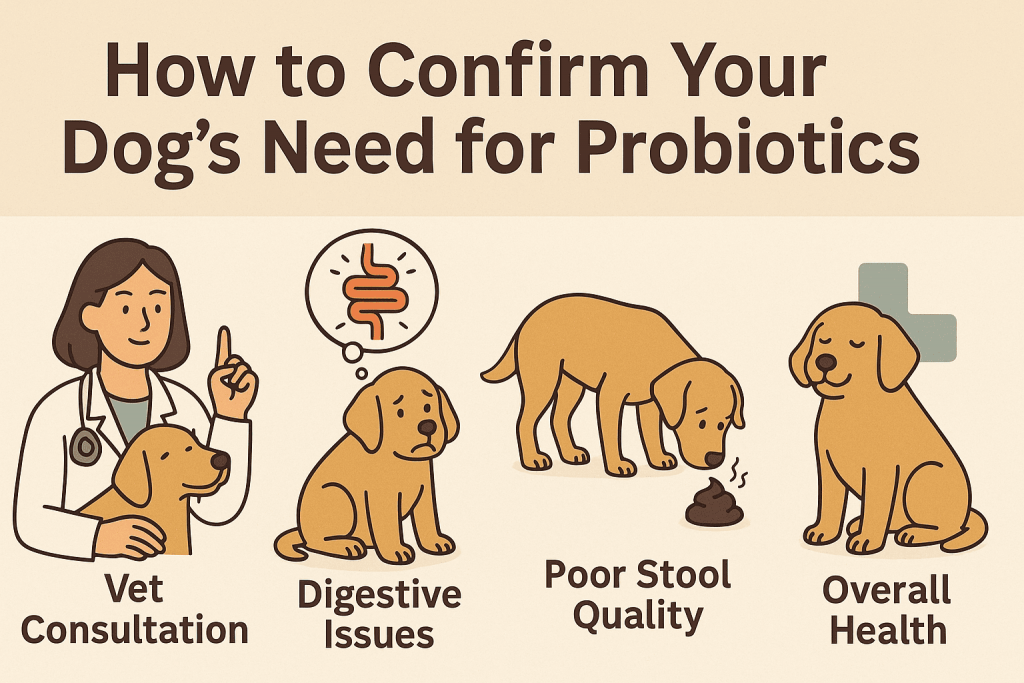
Not every dog displaying one or two of these symptoms requires a probiotic. It’s important to take a holistic view—your dog’s overall health, history, diet, environment, and age all play a role. Below is a checklist you can use as a conversation starter with your veterinarian:
Symptom & Recommendation Checklist
| Symptom | Potential Recommendation |
| Chronic diarrhea or loose stool | Veterinary exam + probiotic trial |
| Recurrent gas or bloating | Diet check + probiotic support |
| Frequent ear/yeast infections | Rule out allergy, consider probiotics |
| Persistent itching or hot spots | Skin workup, may include probiotics |
| Bad breath/body odor | Oral check, probiotic support |
| Irregular appetite/weight changes | Health screen, may support with probiotics |
| Excessive shedding/dull coat | Diet/parasite check, probiotic supplement |
| Anxiety/behavioral changes | Behavioral consult, possible probiotic aid |
| Slow recovery after antibiotics | Vet advice, targeted probiotics |
| Low energy/poor immunity | Full exam, probiotics as adjunct support |
If your dog is experiencing several of these symptoms together, or if symptoms are moderate to severe, a full veterinary examination is always the best next step.
The Science Behind Probiotics: What Research Says
Interest in probiotics for canine health has grown significantly in recent years, supported by emerging scientific research. Understanding how and why these supplements may work can help you make more informed decisions for your dog.
How Probiotics Work in the Canine Gut
Probiotics, when administered in adequate amounts, may colonize the gastrointestinal tract and support a healthy balance between beneficial and potentially harmful microorganisms. This balance is vital for:
- Digesting food efficiently and aiding in the absorption of key nutrients, vitamins, and minerals.
- Maintaining a healthy intestinal barrier, which helps prevent unwanted substances from entering the bloodstream.
- Supporting immune function by stimulating the body’s natural defenses.
- Reducing inflammation by interacting with the gut’s immune cells and signaling molecules.
Recent Research Highlights
Here are some key findings from recent peer-reviewed studies (2024–2025) that shed light on how probiotics—and related microbial therapies—may support canine health:
🧪 Probiotics Support During Dietary Transition
A clinical trial involving healthy adult dogs undergoing rapid diet change showed that supplementation with the yeast probiotic Saccharomyces cerevisiae (about 0.1% of the diet) led to:
- Improved blood markers (higher albumin-to-globulin ratios)
- Increased fecal IgA levels (an immune-strengthening antibody)
- A more stable gut microbiota during the transition period
These findings suggest yeast probiotics may support gut health and immune resilience during dietary stress. [Frontiers in Microbiology, 2025]
🐶 Improvement in Atopic (Allergic) Dermatitis
A 16-week study in dogs with canine atopic dermatitis (cAD) found that daily administration of a multi-strain probiotic significantly decreased clinical severity scores (CADESI-4 and owner-assessed pruritus). Treated dogs also showed improved gut microbial diversity—indicating modulation of the gut-skin axis may reduce inflammatory skin symptoms. [BMC Microbiology, 2025]
⚖️ Probiotics Aid Weight Loss in Obese Dogs
Published data in early 2024 identified two probiotic strains that altered gut microbiome composition and energy metabolism in obese dogs, leading to modest weight loss—even though diet and exercise remained unchanged. This highlights potential metabolic effects of targeted probiotic therapy for overweight dogs. [ScienceDaily, 2024]
🧠 Gut‑Brain Connection & Behavior
Emerging pilot studies and reviews explore links between microbiome composition and behavior in dogs. One investigation found certain gut microbial patterns were associated with fear‑related behaviors. Other work discusses how microbial metabolites like GABA and short‑chain fatty acids may influence mood and stress response in canines via the gut‑brain axis. [ScienceDirect, 2025]
🧬 Microbiome Diversity & Immune Function
A broader survey of canine microbiome research reports that a balanced gut ecosystem (eubiosis) supports digestion, immunity, energy balance, and temperament. Dysbiosis has been linked to weight variation, inflammation, and behavioral changes. Probiotics and synbiotics (combined pre‑ and probiotics) were shown in vitro to enrich beneficial bacterial genera like Bifidobacterium, Faecalibacterium, and Lactobacillus. [Journal of Animal Science and Biotechnology, 2025]
Choosing the Right Probiotic Formula
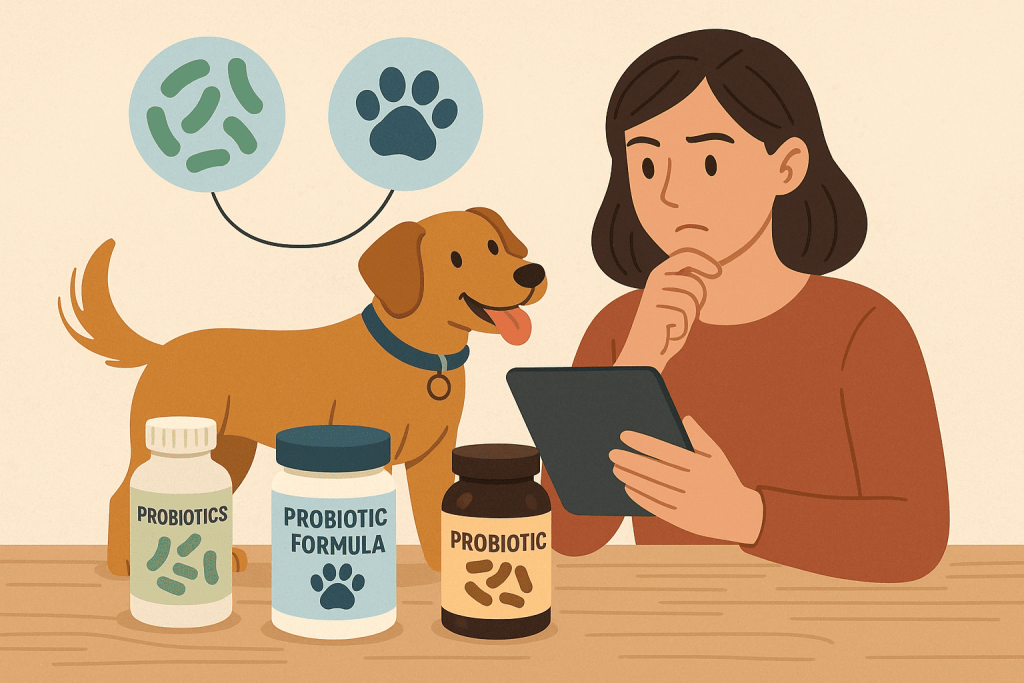
The supplement market is vast and sometimes confusing. Here’s what to look for in a quality dog probiotic:
- Canine-Specific Strains: Certain strains such as Enterococcus faecium, Lactobacillus acidophilus, and Bifidobacterium animalis are commonly used in canine research.
- Guaranteed Potency: Labels should list the number of live microorganisms per serving, often ranging from 1 to 5 billion CFU per dose, adjusted for your dog’s size (see table below).
- NASC or AAFCO Compliance: Products should display the NASC Quality Seal or indicate they meet AAFCO’s nutritional standards. This signals better oversight of ingredient quality and product safety.
- Storage Information: Some probiotics require refrigeration; others are shelf-stable. Always follow storage guidelines to maintain potency.
- Transparent Ingredients & Testing: Trustworthy brands offer third-party testing and a clear list of inactive ingredients.
Probiotic Dosage by Dog Size
| Dog Weight (lbs/kg) | Daily Probiotic Dose (CFU) |
| Up to 10 lbs (4.5 kg) | 0.5–1 billion CFU |
| 11–25 lbs (5–11 kg) | 1–2 billion CFU |
| 26–50 lbs (12–23 kg) | 2–4 billion CFU |
| 51+ lbs (24+ kg) | 4–5+ billion CFU |
Remember, too much can be as problematic as too little. Your veterinarian can help you find the right balance for your dog’s age, weight, and health condition.
Safe Administration & Monitoring
How to Give Probiotics
Probiotics for dogs come in several forms, including powders, capsules, soft chews, and even as an ingredient in special diets. Powders can be sprinkled onto food, chews may be given as a treat, and capsules can be hidden in favorite snacks if your dog is picky.
Steps for safe administration:
- Start Low and Go Slow: Begin with a lower dose than recommended, then gradually increase to the full dose over several days.
- Watch for Side Effects: Mild digestive changes such as soft stool or increased gas may occur initially. These should resolve within a few days.
- Monitor Your Dog: Keep an eye on your dog’s appetite, stool quality, energy, and any changes in their usual behavior.
When to call the vet:
If your dog develops vomiting, severe diarrhea, lethargy, or any new concerning symptom after starting a probiotic, stop the supplement and consult your veterinarian immediately.
Sample Feeding Schedule
| Day | % of Target Dose | Notes |
| 1–2 | 25% | Watch for any reaction |
| 3–4 | 50% | Continue gradual introduction |
| 5–6 | 75% | Most dogs tolerate at this stage |
| 7+ | 100% | Maintain recommended daily dose |
Storage & Potency Tips
- Always check the expiry date on the package.
- Store as recommended—some probiotics lose potency at room temperature.
- Keep out of direct sunlight and moisture.
FAQs (Frequently Asked Questions)
Can I give my dog yogurt instead of a probiotic supplement?
While some plain, unsweetened yogurts contain live cultures, the strains and quantities may not be optimal for dogs. Many dogs are also sensitive to lactose. Dog-specific probiotics are generally a safer, more effective choice.
How soon will I see results from a probiotic?
Some dogs show improvement in stool quality or energy within a few days, but most benefits become clear after 2–4 weeks of consistent use.
Are probiotics safe for puppies and senior dogs?
Most quality probiotics are safe for all ages, but consult your veterinarian for age-appropriate products and dosing.
What if my dog is on medication?
Let your veterinarian know about all supplements. Probiotics are generally safe with most medications, but a few drugs (such as certain immunosuppressants) may interact.
Can I give probiotics daily, or only during illness?
Daily use is common, especially for dogs with chronic digestive issues or after antibiotics. Some owners use them preventively during stressful events (boarding, travel, dietary change).
Beyond Probiotics: Building Lasting Gut Health
Probiotics are just one part of the gut health equation. Here are other ways you can support your dog’s digestive and immune systems:
- Balanced Diet: Feed a diet that meets AAFCO nutritional standards for your dog’s life stage and activity level.
- Regular Exercise: Physical activity supports normal gut motility and mental health.
- Minimize Unnecessary Stress: Sudden changes, travel, or loud environments can affect gut health.
- Deworming & Parasite Prevention: Maintain a regular schedule with your veterinarian.
- Routine Veterinary Checkups: Early detection of issues can prevent chronic problems.
Key Takeaways & Gentle Vet Disclaimer
- Subtle changes in your dog’s digestion, skin, energy, or mood may signal the need for gut support.
- Probiotics may help balance your dog’s microbiome, especially when chosen wisely and used alongside veterinary care.
- Look for products with the NASC seal or AAFCO-compliant labeling, and match the dosage to your dog’s weight (lbs/kg) and health needs.
- Monitor your dog’s response and don’t hesitate to reach out to your veterinarian with any questions.
Remember: Every dog is unique. If you have any concerns about your pet’s health or whether probiotics may be helpful, a gentle conversation with your veterinarian is the best place to start. Together, you can create a plan that supports your dog’s comfort and wellbeing—at every stage of life.
This article is provided for informational purposes only and is not a substitute for professional veterinary care. Always consult your veterinarian before starting new supplements or making significant changes to your dog’s diet or routine.


